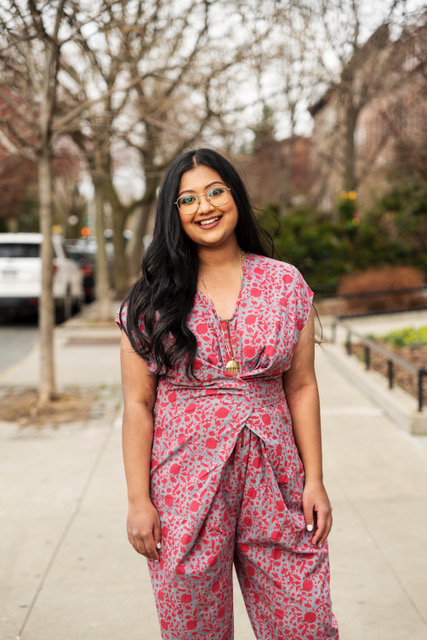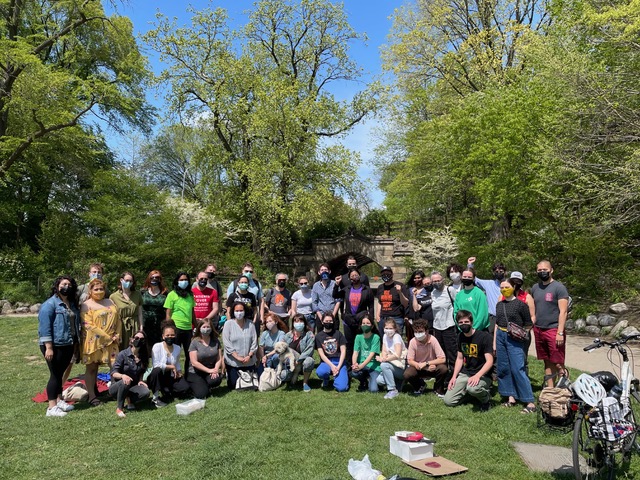
When she was 17 years old, Shahana Hanif received life-changing news. A doctor told her that the reason she was experiencing so much pain each day was that she had Lupus, a disease that causes the body’s immune system to attack its own tissues and organs.
“I barely knew what Lupus was,” said Hanif, a Muslim feminist and daughter of Bangladeshi immigrants running to represent Brooklyn’s 39th District in the New York City Council.
“I had just started the 12th grade when I was diagnosed,” she added. “When I should’ve been thinking about colleges, prom or going abroad, which were the conversations my friends were having, I was needing to understand this degenerative, complicated medical issue that I had never heard about.”
Hanif felt alone. In storybooks, “there were not protagonists who looked like me,” Hanif said. At home and in her community, having a chronic illness was taboo and stigmatized. Despite being diagnosed with an incurable disease that, at a young age, occupied many of her thoughts and emotions, Hanif was pressured to keep her diagnosis, and all of the struggles that came with it, somewhat to herself.
Now 30 years old, Hanif has spent the past 13 years in and out of intensive care units. She has gone through chemotherapy, had biopsies and has had both of her hips and her left shoulder replaced as a result of the complexities of the disease.
At the beginning stages, Hanif remembers waiting for hours and hours, confused and in pain, in the waiting area of the emergency room at Coney Island Hospital. In ICUs, she was consistently left without access to adequate medication.
“The limitations in care for young people and for immigrant communities was very evident,” said Hanif.
A couple of years later, while pursuing her undergraduate degree at Brooklyn College, Hanif remembers struggling to find housing that accommodated her inabilities. “I had not yet had my hips replaced, and I was suffering,” said Hanif. “I couldn’t walk.”
Soon after, Hanif had her application to Access-A-Ride, the NYC public transportation van service designed for those with certain disabilities and health conditions, rejected.
“To get rejected was humiliating,” she said. “It is absurd to think that a service that should be available to people like me includes bureaucracy. I didn’t get to make the decision for myself, someone else did. This meant that I was spending hundreds of dollars on car services to get to and from doctors’ appointments. This was before Uber, Lyft and other rideshares.”
For over a decade, Hanif has felt the weight of living with Lupus. But as a Muslim woman with parents who immigrated from Southeastern Asia, she knows firsthand that structural inequities are not limited to those with illnesses or disabilities.
“This disease pushed me into becoming a fighter,” said Hanif. “I learned to advocate for myself.”

Throughout college and her professional career, Hanif has actively worked as an organizer in and around her home neighborhood of Kensington. Since May of 2018, Hanif has served as the director of organizing for current District 39 councilman Brad Lander, who is giving up his seat because he has reached his term limit.
Hanif has focused a lot of her work on preserving and expanding public space for community events, advocating for immigrants and protecting those affected by domestic violence. She helped create the Avenue C Plaza, a public park in Kensington, a neighborhood long-known for its lack of public outdoor space. In April of 2019, Hanif was profiled in The New York Times after helping a Bangladeshi woman escape from an abusive forced marriage.
If elected, Hanif would become the first Muslim and South Asian woman ever to serve in the New York City Council. She would also be the first woman ever elected to represent District 39, which covers Park Slope, Kensington, Carroll Gardens, Cobble Hill, and parts of Borough Park.
As a city council member, Hanif’s number one priority would be improving education equity in the District.
“I am a student of the district. I went to P.S. 230 in Kensington,” said Hanif.
Hanif personally experienced the local public education system, which she said routinely fails many students and their families, particularly those who are immigrants or have disabilities.
Specifically, Hanif would work to end admissions screening, a process heavily criticized for putting Black and brown students at a disadvantage. She would push for smaller class sizes, more guidance counselors and accessibility for students with disabilities. And she would work to create pipelines for Black and brown teachers.
The second mission on Hanif’s agenda would be pushing for “free and accessible healthcare.” She would organize for universal healthcare and push to create a statewide single-payer healthcare system. She also claims that she would invest in translators and interpreters in the healthcare system to help immigrants, like her parents, understand what doctors and nurses are telling them. And she would recruit mental health counselors of color, with disabilities and from immigrant communities to work in public hospitals and community-based health clinics.
As the daughter of a Bangladeshi restaurant owner, the third item on Hanif’s long list of priorities is to provide a path for small businesses to recover from the COVID pandemic.
“So many stores on 5th Avenue and 7th Avenue are shuttered,” said Hanif. “The most impacted are women-and minority-owned businesses.”
Specifically, Hanif wants to pass commercial rent cancellation, pass commercial rent control and permanently establish the Open Streets program, which provides restaurants and bars with more space to sit people and allows for more public art and performances.
“I’m envisioning a new form of governance, one that isn’t alienating folks or making politics or government a separate entity,” said Hanif. “I’m just taking all of the work I’ve done, now with some bigger tools, to city hall. And the folks I’ve been working with are coming with me.”
LEARN MORE ABOUT SHANA FROM BK
